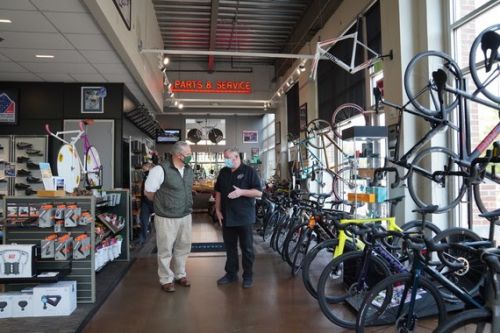WASHINGTON (BRAIN) — The U.S. Department of Interior officially approved its policy proposal for land managers to regulate e-bikes the same as traditional bikes on non-motorized lands.
The decision comes after a 60-day comment period for the National Park Service, Bureau of Land Management, U.S. Fish and Wildlife Service, and the Bureau of Reclamation users to offer opinions. The policy becomes effective 30 days after publication in the Federal Register.
The result paves the way for land managers to allow increased e-bike usage, "especially for older Americans and those with physical limitations," according to a Department of Interior news release.
"Enhancing access to our public lands and expanding recreational opportunities to all Americans is a priority for the Trump Administration," said Secretary of the Interior David L. Bernhardt in the release. "The new regulations allow our public land managers to provide e-bike access to bike trails, enhancing the opportunities to utilize our public lands to create life-long memories."
The policy adopts the existing federal definition of e-bikes as a two- or three-wheeled vehicle with fully operable pedals and an electric motor of no more than 750 watts. The agencies will regulate Class 1 and 3 e-bikes the same as traditional bikes with each park superintendent having final say-so as to where and if they can be used. Class 1 e-bikes are pedal-assist to 20 mph. Class 3 are pedal-assist to 28 mph.
Class 2, throttle-assist to 20 mph, will be allowed on non-motorized trails, but activation of throttle-assist exclusively can't be used "for an extended period of time" without pedaling. This change to the final rule enables enforcement of the limitations on how Class 2 e-bikes may be used in a reasonable manner that ensures protection of public health, safety, resources, and uses of the public lands, according to the DOI.
Local land managers will carry out the new regulations in their jurisdictions after taking into consideration public health and safety, natural, and cultural resource protection and other management activities and objectives, said the DOI, which added public lands designated by Congress as "wilderness areas" will remain off-limits to traditional bicycles and e-bikes.
The policy proposal first made last August allowed e-bikes access to non-motorized trails. It called on Interior bureaus to develop regulations to allow for e-bike use where traditional bicycles are allowed and to bring federal land e-bike use more in line with state rules. According to the DOI, the NPS policy already has resulted in more than 385 national parks evaluating e-bike use.
However, increased e-bike access has led to lawsuits. One was filed in December against the NPS by The Public Employees for Environmental Responsibility and a coalition of conservation groups, who are the primary plaintiffs. The suit claims Bernhardt and Deputy NPS Director P. Daniel Smith regularly met in private with an industry-dominated advisory committee at Interior headquarters and through conference calls. The suit says the meetings violate the Federal Advisory Committee Act, which requires transparency to prevent secret lobbying.
PEER officials said some of their concerns over increased e-bike use range from increased speeds endangering visitors and wildlife and spooking horses on mixed-use trails
“The Park Service’s undue haste resembles an e-bike whizzing by with an irresponsible teenager on the throttle,” PEER Senior Counsel Peter Jenkins told the National Parks Traveler on Friday. “Interior and the Park Service realized they were caught with their legal pants down and are scrambling for cover. This rule is the product of industry influence having nothing to do with improving the park experience — a topic on which the Park Service has yet to even do a preliminary assessment. Given the major challenges facing a Park Service in the grip of a pandemic, this is a questionable use of its limited regulatory resources.”
Another lawsuit was filed by a group of trail and forest advocates against the U.S. Forest Service in October for allowing Class 1 e-bikes on non-motorized trails in the Tahoe National Forest without first conducting a public study. While the DOI oversees the NPS, the Department of Agriculture has jurisdiction over the forest service.
Both suits are still pending.


